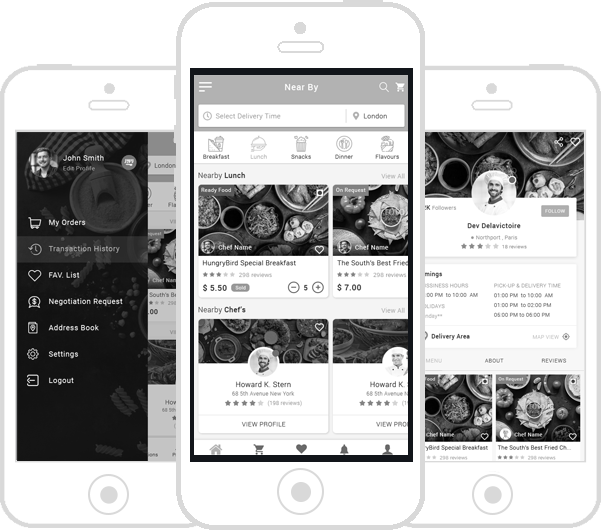eCommerce App Development for Startups
Having a strong eCommerce app is essential for entrepreneurs hoping to succeed in the current digital environment. At App Development Company, we specialize in creating scalable, high-performing eCommerce apps tailored to your unique business requirements.


Why Choose eCommerce App Development?
As e-commerce grows, having a well-designed eCommerce app provides the following benefits:
- Expand your audience: Communicate with clients at any time and from any location.
- Improve the User Experience: Give customers a flawless shopping experience to entice them to return.
- Increase Sales: To increase conversions, incorporate tools like push notifications, tailored suggestions, and simple checkout.
Our Development Process
-
1. Understanding Your Vision: To begin, we talk about your objectives, target market, and USPs.
-
2. Research and Strategy: To find opportunities and trends unique to your area, our team performs market research.
-
3. Design and Prototyping: We produce visually appealing and easily navigable designs that capture the essence of your business.
-
4. Development: Using the latest technology, we create a scalable, secure app with all the features you need.
-
5. Extensive Testing: Ensures a flawless experience on all platforms.
-
6. Launch and Support: To keep your app running smoothly, we assist with the launch and provide ongoing support.


Key Features of Our eCommerce Apps
-
User-Friendly Interface: Easy navigation and a visually appealing layout to enhance user experience.
-
Secure Payment Gateway: Multiple payment options with top-notch security to build customer trust.
-
Product Management: Simplified tools to add, update, and manage your product listings effortlessly.
-
Customer Profiles: Allow users to create accounts for personalized experiences.
-
Order Tracking: Keep customers informed about their order status in real-time.
-
Analytics Dashboard: Gain insights into user behavior and sales performance for informed decision-making.
Why Partner with App Developers India?
-
Expertise in eCommerce Solutions: Our experienced developers stay updated with the latest trends and technologies in eCommerce.
-
Tailored Solutions: We understand that every startup is unique, and we customize our services to fit your specific needs.
-
End-to-End Support: From ideation to post-launch maintenance, we’re with you every step of the way.
-
Competitive Pricing: Get high-quality app development without breaking the bank.


Get Started Today!
Ready to take your startup to the next level with an eCommerce app? Contact us today to discuss your project and discover how App Developers India can turn your vision into reality. Let’s create something amazing together!
1.eCommerce Applications Development
Development of eCommerce apps is crucial for companies looking to make a big online impression. A well-designed app makes it simpler for consumers to shop while they're on the move by streamlining the checkout process and increasing customer engagement. Businesses may increase revenue and foster customer loyalty by concentrating on functionality and user experience.
Principal Advantages:
- Enhanced customer accessibility
- The purchase process has been simplified.
- Increased interaction with customers
- Notifications and updates in real time


2.Mobile Application Development for eCommerce
In today's mobile-centric environment, eCommerce mobile app development is essential. With more people purchasing on smartphones, businesses can more effectively reach their target audience by having a specialized mobile app. Using a mobile app that offers simple navigation, push notifications, and personalized experiences can lead to higher conversion rates.
Benefits
- Personalized retail encounters
- Sales alerts are pushed
- Streamlined methods of payment
- Customer retention has increased.
3.eCommerce Options for New Businesses
To thrive in a cutthroat market, companies must choose the best eCommerce solutions. Customized eCommerce platforms can assist new businesses in getting online quickly and responding to changing clientele demands. Startups may focus on growth and streamline operations with the proper solutions.
Important Characteristics:
- Rapid deployment and setup
- Scalability to support expansion
- Affordable options
- Integration of commonly used payment gateways


4.Launching an E-Commerce App
We specifically design an eCommerce startup app for new companies looking to enter the internet market. These programs usually concentrate on key features that improve user experience at a reasonable price. Startups may engage their audience and build brand loyalty right away by releasing a specialized app.
Crucial Components:
- Simple product administration
- An interface that is easy to use
- Payments are handled safely.
- Reviews and comments from customers
5.Development of Personalized eCommerce Applications
Businesses have the freedom to construct custom eCommerce apps that precisely match their brand and functional requirements. By creating a custom solution, businesses may add features that set them apart from rivals and give their customers a customized purchasing experience.
The Advantages of Personalized Solutions
- Customized functions and features
- Improved adherence to corporate objectives
- Users have an improved experience
- Continuous upkeep and assistance


6.eCommerce Mobile App Design
The design of eCommerce mobile apps significantly influences user satisfaction and engagement. Higher conversion rates result from an intuitive design that not only draws customers in but also makes the purchasing experience easier. Prioritizing user-friendly design features can significantly enhance the overall app experience.
Design Points to Remember:
- Simple layout and navigation
- Aesthetically pleasing design
- Responsive design on all devices
- Quick loads
7.Reasonably Priced eCommerce App Development
The availability of reasonably priced eCommerce app development Company enables startups and small enterprises to participate in the online marketplace. By utilizing cost-effective solutions, businesses can achieve high-quality app functionality without going over budget, freeing up resources for other important projects.
Important Characteristics:
- Affordable solutions
- Superior functionality and design
- Modifiable pricing structures
- Options for ongoing assistance


8.Features of eCommerce Apps
Comprehending the fundamental aspects of eCommerce apps can assist enterprises in crafting an engaging consumer journey. Important features like wish lists, user profiles, and feedback from previous customers can improve user interaction and expedite the buying process, making it simpler for customers to shop.
Essential Features:
- Profiles and user accounts
- Product filtering and searching
- Favorites and want lists
- Reviews and ratings from customers
9.Top eCommerce Application Development Firm
Selecting the top eCommerce app development firm is essential to guaranteeing the success of the project. Reputable businesses possess a proven track record of success, a knowledgeable staff, and the ability to tailor solutions specifically to your company's needs.
What to Watch Out For
- Knowledge of developing eCommerce applications
- A robust portfolio of prior work
- Customer endorsements and assessments
- All-inclusive support services


10.Services for Developing eCommerce Applications
Full-service eCommerce app development includes everything from prelaunch planning to postlaunch assistance. A full-service supplier can take care of the design, development, and marketing of your app, making sure it not only works well but also efficiently reaches your target audience.
Services Provided:
- Developing and designing custom applications
- Payment gateway integration
- Strategies for marketing and promotion
- Continuous upkeep and assistance
11.Small Business eCommerce App
For small businesses, an eCommerce app can be revolutionary, giving them a way to expand their customer base and boost revenue. These apps often focus on essential features specifically designed to meet the needs of small businesses, empowering them to rival more established competitors.
Advantages:
- Increased market visibility
- Enhanced communication with customers
- Affordable advertising options
- Simpler inventory management


12.Easy-to-Use eCommerce Applications
Making eCommerce apps that are simple to use is essential to keeping users satisfied and promoting repeat business. When paired with simple navigation and intuitive design, a flawless user experience can greatly increase user happiness and boost revenue.
Important Elements:
- Straightforward layout and navigation
- Rapid loading speeds
- Simple checkout procedure
- Prompt client service
13.The Development Process of an eCommerce App
For eCommerce software to debut successfully, it is vital to comprehend the development process. Every phase, from preliminary research and design to testing and implementation, is essential to producing an excellent application that lives up to user expectations.
Phases of Development:
- Planning and investigation
- Create and iterate
- Creation and evaluation
- Launch and continuous assistance


14.Solutions for Scalable eCommerce Applications
Scalable eCommerce apps enable companies to expand and adapt to market demands. Businesses may simply add new features and capabilities as they grow by investing in a scalable infrastructure, which guarantees long-term success.
Advantages of Expandability:
- The ability to implement new features with flexibility is crucial.
- The ability to effectively handle an increase in traffic
- Long-term financial savings
- Investing in the future of your company is crucial.
15.eCommerce Website for New Businesses
An eCommerce platform for new businesses offers the resources required to set up and run an online store. Using these platforms, new companies can take advantage of built-in capabilities and assistance while streamlining operations and concentrating on developing their brand.
Platform Benefits:
- Simple to set up and maintain
- Payment solutions that are integrated
- Tools for reporting and analytics
- The community provides resources and assistance.

List of eCommerce App Development for Startups
| Stakeholder | Relevant Apps |
|---|---|
| Founders/Entrepreneurs | Business Management Apps (e.g., Trello, Asana) |
| Developers | Code Repositories (e.g., GitHub, GitLab) |
| Designers | Design Tools (e.g., Figma, Sketch) |
| Marketing Team | Social Media Management (e.g., Hootsuite, Buffer) |
| Sales Team | CRM Tools (e.g., Salesforce, HubSpot) |
| Customers | Mobile eCommerce Apps (e.g., Shopify, WooCommerce) |
| Investors | Financial Analysis Tools (e.g., QuickBooks, Xero) |
| Customer Support | Help Desk Software (e.g., Zendesk, Freshdesk) |
Founders/Entrepreneurs Screens for Software Development
| Screen | Features | Explanation |
|---|---|---|
| Dashboard | Key Metrics, Sales Overview, User Analytics | Provides a snapshot of business performance, including sales data, user engagement, and key performance indicators (KPIs). |
| Product Management | Add/Edit Products, Inventory Tracking, Product Categories | Allows entrepreneurs to manage product listings, track inventory levels, and organize products into categories. |
| Order Management | View Orders, Order Status, Shipment Tracking | Enables founders to manage incoming orders, track their status, and monitor shipping and delivery. |
| Financial Reports | Sales Reports, Expense Reports, Profit Margins | Generates detailed financial reports to help assess profitability and manage budgets effectively. |
| Marketing Tools | Email Campaigns, Social Media Integration, Promotions | Facilitates marketing efforts by allowing founders to create campaigns, integrate social media, and manage promotions. |
| User Management | User Profiles, Roles & Permissions, Feedback | Enables management of user accounts, setting roles and permissions, and collecting feedback for improvements. |
| Settings | Account Settings, Notification Preferences, Payment Options | Provides access to configure account settings, manage notifications, and set payment processing options. |
| Support & Resources | Help Center, FAQs, Contact Support | Offers access to help resources, frequently asked questions, and support contact information for troubleshooting. |
Developers Screens for Software Development
| Screen | Features | Explanation |
|---|---|---|
| Dashboard | Project Overview, Task Status, Code Metrics | Provides a visual overview of ongoing projects, task assignments, and key code metrics such as code quality and test coverage. |
| Code Repository | Version Control, Branch Management, Pull Requests | Integrates with version control systems to manage code repositories, including branch creation and pull request reviews. |
| API Management | API Documentation, Testing Tools, Usage Analytics | Allows developers to manage APIs, view documentation, perform testing, and analyze usage metrics. |
| Bug Tracking | Report Bugs, Bug Status, Assign Developers | Enables reporting and tracking of bugs, updating their status, and assigning them to specific developers for resolution. |
| Deployment Management | Deployment Pipeline, Rollback Options, Environment Management | Manages deployment processes, including monitoring pipelines, rolling back updates, and managing different deployment environments. |
| Collaboration Tools | Chat Integration, File Sharing, Commenting | Facilitates team collaboration through integrated chat, file sharing options, and the ability to comment on code and tasks. |
| Testing Tools | Automated Testing, Test Coverage Reports, Manual Testing | Provides tools for automated testing, generates test coverage reports, and facilitates manual testing processes. |
| Settings | Profile Settings, Notification Preferences, Integration Settings | Allows developers to configure their profile, set notification preferences, and manage integrations with other tools. |
Designers Screens for Software Development
| Screen | Features | Explanation |
|---|---|---|
| Dashboard | Project Overview, Design Metrics, Feedback Summary | Displays a summary of ongoing design projects, key metrics, and consolidated feedback from stakeholders. |
| Design Workspace | Canvas Area, Design Tools, Layers Panel | Provides a dedicated workspace for creating and editing designs, complete with essential design tools and layer management. |
| Prototype Viewer | Interactive Prototyping, Feedback Collection, Sharing Options | Allows designers to create interactive prototypes and collect feedback from stakeholders or team members. |
| Asset Library | Image Uploads, Design Components, Asset Organization | Manages design assets such as images and components, allowing for easy upload, organization, and reuse in projects. |
| Style Guide | Brand Colors, Typography, UI Components | Defines and maintains a style guide that includes brand colors, typography styles, and standardized UI components. |
| Collaboration Tools | Comments, Version History, Team Chat | Facilitates collaboration with features for commenting on designs, tracking version history, and integrating team chat. |
| Design Review | Request Feedback, Review Cycle, Approval Workflow | Allows designers to request feedback on their work, manage the review cycle, and track the approval process. |
| Settings | Profile Settings, Notification Preferences, Integration Management | Enables designers to configure their profile, set notification preferences, and manage integrations with other tools. |
Estimated Cost Brakedown of eCommerce App Development for Startups
| Component | Description | Estimated Cost (USD) |
|---|---|---|
| Market Research | Analyzing competitors, target audience, and market trends. | $2,000 - $5,000 |
| UI/UX Design | Creating user interfaces and experiences, including prototypes. | $3,000 - $7,000 |
| Development | Backend and frontend development of the app, including API integrations. | $10,000 - $25,000 |
| Testing & QA | Quality assurance, bug fixing, and testing across devices. | $2,000 - $5,000 |
| Deployment | Hosting setup, app store submissions, and launch preparations. | $1,000 - $3,000 |
| Marketing & Launch | Initial marketing campaigns, advertisements, and promotions. | $5,000 - $15,000 |
| Maintenance | Ongoing support, updates, and feature enhancements post-launch. | $1,000 - $3,000/month |
| Total Estimated Cost | Sum of all development and launch expenses. | $24,000 - $58,000 (initial launch) |
top 10 eCommerce Development for Startups apps
Frequently Asked Questions (FAQs)
1. How do developers create eCommerce apps?
The process of developing web or mobile applications that facilitate online sales and purchases of goods and services is known as eCommerce application development.
2. How much time does it take to create an app for eCommerce?
Though it might vary, the average development period is between three and six months, depending on the features and complexity needed.
3. What essential components make up an eCommerce app?
User registration, the product catalog, the shopping cart, the integration of payment gateways, order administration, and customer assistance are all considered essential elements.
4. How much does creating an eCommerce app cost?
Prices can vary greatly, but for a simple app, they usually fall between $20,000 and $50,000, depending on the platform and features.
5. Which platforms should I target with my eCommerce app?
To reach a larger audience, it's typical to target both iOS and Android, but web apps are also crucial for accessibility.
6. What technologies do we use to create eCommerce apps?
Flutter, Node.js, React Native, and several payment methods like PayPal and Stripe are examples of popular technologies.
7. How do I guarantee the security of my eCommerce app?
Use secure payment methods, install SSL certificates, and abide by data protection laws like GDPR.
8. What eCommerce app design best practices are there?
Pay close attention to responsive design, high-quality photos, user-friendly navigation, and quick loading times.
9. How should I promote my eCommerce app?
To improve visibility, make use of email marketing, paid advertising, social media marketing, and search engine optimization (SEO).
10. What typical difficulties arise while developing an eCommerce app?
Keeping up with technological advances, guaranteeing security, competing in the market, and offering top-notch user experiences are among the challenges.
11. Is it possible to include external services in my eCommerce application?
Integration with third-party services such as analytics tools, payment processors, and inventory management is possible with the majority of eCommerce apps.
12. How can my eCommerce app monitor user behavior?
Employ analytics programs like Mixpanel or Google Analytics to track user behavior and enhance the user experience.
13. What payment methods should my application provide?
Consider offering a range of payment options, including PayPal, digital wallets like Apple Pay and Google Pay, credit/debit cards, and more.
14. How should my eCommerce app handle inventory?
Set up inventory management systems that communicate with your application to monitor sales, product availability, and stock levels.
15. What kind of help should I offer after launch?
To maintain app speed, provide regular updates and bug fixes in addition to chatbot, email, and phone support.
Your choice of weapon
Build your Apps for any Platform
We to code. It's our passion










you can also reach us at our given
email address or phone number.







